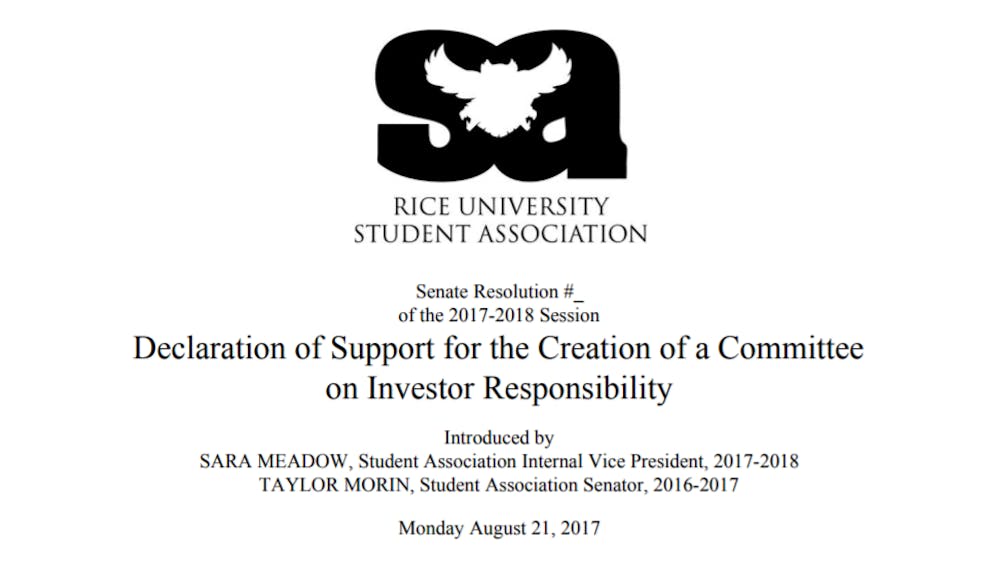SA to vote on investor responsibility committee

Rice University currently has no mechanism for leveraging its endowment's investment to influence corporate policy, but the Student Association will vote at its Tuesday meeting on a resolution calling to change that. The resolution expresses SA support for the creation of a Committee on Investor Responsibility, through which Rice would vote on shareholder resolutions for the companies it invests in.
The Rice Management Company, which could not be reached for comment at the time of publication, decides where to invest the endowment, which provides for about 40 percent of the university’s operating cost. But they have neither the time nor the resources to monitor shareholder votes and decide how to act on them, according to Taylor Morin, author of the CIR bill and Brown College senator.
This means that if one of the companies that Rice invests in has a vote that could make the company more socially responsible, Rice will abstain, effectively voting against the proposal, Morin, a junior, said.
Proposals with important social implications happen with surprising regularity, according to Morin. The Interfaith Center on Corporate Responsibility saw its members file 283 shareholder proposals in major companies with broad social implications in the last year.
The passage of the resolution would not actually create the committee, which is outside of the authority of the SA, but would signal SA support for its creation. SA Parliamentarian Maurice Frediere said he believed the passage of the resolution by the SA would make the creation of the CIR likely, however.
Morin said he believes that the CIR would give Rice the opportunity to hold corporate entities accountable by encouraging moral practices. One issue facing the committee, however, would be transparency. The Rice Management Company does not make public the companies it invests in to protect its investment strategy. For this reason, votes by the committee likely could not be made public either, according to Morin.
To ensure the effectiveness of the committee, the CIR resolution has a number of measures meant to prevent the committee from becoming politicized, according to Frediere.
“To prevent this, terms will be staggered so that a new group of students can’t come in and radically change the vision or purpose of the committee,” Frediere, a Duncan College junior, said.
The bill also outlines a specific decision-making framework for the committee that Morin said would ensure objectivity, and limits the types of votes that the committee can act on. It does this by creating “Areas of Engagement,” categories of issues that the Rice community appears to have a strong consensus on. This is to prevent the committee from making abstract political statements that could further marginalize the campus’s conservative voices, Morin said.
The committee would be guided by the “Basic Policy,” which states that in order for a shareholder proposal to be eligible for Rice to vote on, it must propose a practical solution with proven effectiveness to a social harm that can be demonstrated numerically by direct evidence, such as climate change, Morin said.
“Of course, this is still a subjective standard, but questions similar to what this committee faces can never be answered objectively,” Morin said.
For Morin, the benefit of such a committee comes not necessarily from its effectiveness as a corporate watchdog, but from the message it sends.
“To not vote on these [select] resolutions when there is a potential for social change would be equivalent to not voting in an election because ‘My vote doesn't matter,’” Morin said. “There is no reason why Rice should abstain from these votes.”
More from The Rice Thresher

Rice football kicks off Abell era with commanding road win
For the first time since 2018, Rice football opened its season with a victory. Scott Abell was soaked with yellow Powerade following a 14-12 win on the road Saturday against the University of Louisiana at Lafayette, which won 10 games and made it to the Sun Belt Conference championship last season.

Dis-O, move-in weekend see increase in alcohol transports from last year
Rice’s first wet weekend of the year saw four times as many calls for intoxication-related transports of students to the hospital compared to the previous three years, according to emails sent out by college presidents and chief justices.

On-campus meal plan changed to unlimited swipes
Housing and Dining recently revealed a new dining plan for the upcoming semester. The required on-campus meal plan now has unlimited meal swipes, compared to 375 meal swipes last year. H&D said the previous on-campus meal plan was for students who intended to eat on campus 15 to 25 meals a week.

Please note All comments are eligible for publication by The Rice Thresher.